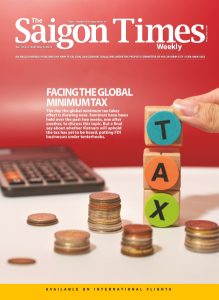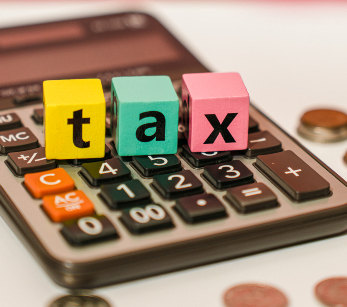The day the global minimum tax takes effect is drawing near. Seminars have been held over the past two weeks, one after another, to discuss this topic. But a final say about whether Vietnam will uphold the tax has yet to be heard, putting FDI businesses under tenterhooks.
Some 90 groups feel the pinch
“South Korean firms, when mulling their investment plans, have recently pondered: where else if not Vietnam?” Son Won Sik, an executive at the Korean Chamber of Commerce and Industry in Vietnam (Korcham), said at a seminar on the global minimum tax convened by the National Assembly’s Finance-Budget Committee on April 24.
The worries among South Korean businesses stem from the global minimum corporate income tax initiated by the Organization for Economic Cooperation and Development (OECD) to prevent the competition for FDI via tax incentives, which will be applied in many countries in early 2024.
To date, 163 countries, including Vietnam, have agreed to the OECD-initiated policy, under which multinational corporations (MNCs) with annual revenue of 750 million euros (some US$870 million) will be subject to the minimum corporate tax of 15%. Those companies currently enjoying a tax rate lower than 15% in the host country of their investment will have to pay the difference in the country where they are headquartered. Under this policy, a country may not apply the minimum tax but will be obliged to recognize regulations on this tax in other countries.
Dang Ngoc Minh, deputy head of the General Department of Taxation, said most countries with outbound investments will apply the minimum tax next year to benefit from the tax difference. These include countries and territories with strong FDI activity in Vietnam, like South Korea, Japan, Hong Kong and Singapore. Countries home to major sources of FDI are also weighing countermeasures to prevent FDI enterprises from remitting the tax difference back to the countries where they are headquartered while mulling financial support policies to retain FDI projects and attract new investors.
“In Vietnam, there are now some 90 MNCs to be impacted by the global minimum tax,” said Dang Ngoc Minh. “This number is extracted from the latest data, based on the corporate income tax payments made in 2022.” The difference between the global minimum tax and the real payments to be made under prevailing tax policies will be in the range of VND10-20 trillion in 2024. These MNCs will have to pay the difference either in the country where they are headquartered or in Vietnam if the country joins the OECD scheme.
No matter where they pay the difference, MNCs would still see their earnings shrinking. “As such, the tax incentives they are entitled to would no longer exist or be sharply reduced. Preferential investment policies will be neutralized in many cases,” said Phan Duc Hieu, a member of the NA Economic Committee. As the tax incentives might disappear, the FDI community in the country has kept a close watch on whether Vietnam will join the global minimum tax system or not or if Vietnam will have any compensatory incentives for enterprises to be affected by the tax.
“We hear Vietnam will join”
The initiative by OECD was endorsed in October 2021. Since the middle of 2022, the global minimum tax has become a subject being much talked about in Vietnam. Last August, a special working group was established by the Prime Minister to study and propose measures related to the global minimum tax, but it was not until eight months later, in April 2023, when a statute for this working group was issued, and during the limbo, there were few formal discussions on the global minimum tax. Vietnam will have to race against time in the next eight months to work out measures so as to keep up its tax jurisdiction on the one hand and attract large-scale international investors on the other hand.
At a session of the NA Standing Committee on April 10, 2023, NA Chairman Vuong Dinh Hue showed his impatience, saying the global minimum tax is an urgent issue requiring policy actions, including amending laws to make the most of opportunities and cope with challenges. However, the Government has made no proposal to this effect in the 2023-2024 law-making program. The NA leader stated that mapping out responses for the global minimum tax is a critical requirement now, and amending the Corporate Income Tax is one of the radical steps for alignment. “It must be done!” stressed the NA leader. “Otherwise, we relinquish our taxation right, and as such, our competitiveness and capacity to attract investment would be heavily impacted.”
Soon after, multiple actions around the global minimum tax have been taken. The Finance Ministry convened a large-scale conference drawing many economists, tax consultants, and representatives of major FDI enterprises active in Vietnam, like Samsung, Canon, and Bosch who discussed experiences of other countries in applying the global minimum tax and recommendations for Vietnam. The Ministry of Planning and Investment had a working meeting with auditing firms to discuss appraisals and recommendations of OECD surrounding the global minimum tax. The NA Finance-Budget Committee also organized an open forum, with the online participation of OECD experts, to look for measures and recommendations.
At a meeting with foreign investors in late April, Prime Minister Pham Minh Chinh asserted Vietnam always appreciates conformity to the law and proactively participates in international commitments, including the global minimum tax. He said the Government had urged relevant bodies to review current regulations and consider measures to attract investment and map out non-tax incentives that do not go against international rules and commitments, with an aim to harmonize benefits for and provide equal treatment to all parties to support current investors and attract new ones. Relevant bodies are also told to review and improve regulations and introduce a roadmap to apply the global minimum tax, taking into account international experiences suitable to Vietnam’s conditions.
Despite such assertions, FDI enterprises are still worried, given the absence of a formal commitment from the country’s top leadership to join the global minimum tax from 2024. Son Won Sik of Korcham pondered: “We’ve heard Vietnam would join (the global minimum tax system), but we’re not sure if it is correct.” The FDI community is now waiting for a formal announcement about Vietnam’s participation in the global minimum tax as well as its compensatory incentives so that FDI companies can feel rest assured and proceed with their investment plans. Other technical issues, such as how to apply the global minimum tax and how support measures are rolled out, can be discussed later.
Vietnam should apply Qualified Domestic Minimum Top-Up Tax
Robert King, partner and tax leader for Vietnam, Laos and Cambodia at Ernst & Young Vietnam, said each country needs to safeguard its interests to avoid being an outsider proactively in the face of the global minimum tax. He recommended that Vietnam proactively secure the right to tax and continue to create a favorable business environment to maintain its competitiveness in attracting foreign investment.
 King suggested Vietnam apply the qualified domestic minimum top-up tax (QDMTT). Experts from OECD, the World Bank, auditing firms, and law firms have approved of this recommendation, saying the QDMTT is a standard regime in line with OECD rules. Other regimes, such as applying the 15% corporate income tax, will not be consistent with OECD calculations, resulting in higher tax liabilities for MNCs, which will cause financial losses for investors and set Vietnam’s tax policies on a collision course with the world’s practices.
King suggested Vietnam apply the qualified domestic minimum top-up tax (QDMTT). Experts from OECD, the World Bank, auditing firms, and law firms have approved of this recommendation, saying the QDMTT is a standard regime in line with OECD rules. Other regimes, such as applying the 15% corporate income tax, will not be consistent with OECD calculations, resulting in higher tax liabilities for MNCs, which will cause financial losses for investors and set Vietnam’s tax policies on a collision course with the world’s practices.
Dr. Can Van Luc with BIDV agreed that Vietnam should apply the QDMTT to safeguard its taxation right instead of handing over this power to other countries. At the same time, to compensate for negative impacts on MNCs, Vietnam should work out suitable policies for two groups of investors. For FDI enterprises active in Vietnam, there should be support policies in terms of land rents, tax discounts, manpower training, R&D costs, site clearance, and housing for their employees. For would-be investors, apart from similar incentives mentioned above, Vietnam can offer higher support for priority projects.
The global economic slowdown, coupled with the global minimum tax, can be seen as double impacts on enterprises, especially MNCs that Vietnam wants to attract. Therefore, it is recommended that the Government accompany investors with strong policies to retain operational giants and attract new ones, according to Robert King of Ernst & Young Vietnam.









